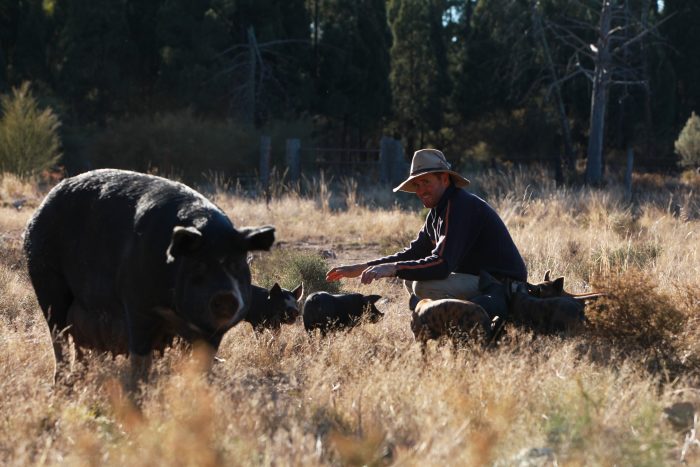Business: Extraordinary Pork, Dubbo
Valuing the product is what pork producer Michael Hicks places at the top of his priority list. Along with wife Alexandra, Mr Hicks started a pig farm north of Dubbo with a view to providing the best quality pork to consumers.
“We had a list of requirements when we started the farm,” he said. These needs included accessibility, being away from highway noise and overhead power lines.
Establishing Extraordinary Pork in 2012 was a learning curve for the couple.
“We searched for a year for the right property. What we found ticked most boxes.”
Mr Hicks said there are certain challenges in starting a business but finding mentors in the industry helped in the early days.
“It involves significant change, I learnt from a mentor. There are loads of people in the industry who are more than happy to tell you stuff; it’s just a matter of asking.
“Someone will learn from someone and then someone asks what else can I learn. The best thing is to keep asking questions.”
In their enterprise, the Hicks family has power over the journey from paddock to plate and their aim is to have the most contented animals and customers to match. Their primary concerns are maintaining animal welfare and regenerative farming practices.
Their free-range piggery allows for regular rotation of the animals, keeping everyone happy.
“Our pigs are constantly moved to mimic native regeneration and avoid the moonscape effect,” he said.
The pigs are also fed a diet specially designed by a nutritionist to optimise their health and wellbeing.
“Having the right feed and great nutrition makes such difference. We had a 40 per cent increase in productivity,” Mr Hicks said.
Improved nutrition has enhanced growth rates, litter sizes and infertility. While it is more expensive, it’s a valuable investment.
To ensure the optimum product, Mr and Mrs Hicks are always planning well in advance.
“It takes nine months from joining the pigs to pork production - the cycle of the farrow through to packing and delivery, so that is our preparation time,” he said.
Construction of a micro mobile abattoir on-farm has helped to reduce the stress on the animals of travelling off-farm.
“We are just always looking at improvements, things that change processes or contribute to technology, improving customer service,” Mr Hicks said.
He also maintains a very small customer base through a system of Community Supported Agriculture (CAS) to ensure ongoing high-quality production.
“Community Supported Agriculture is about truly connecting people to their food,” he said.
“We want our members to see how their pork is grown, to have a connection with their food and feel reassured that the food their family eats is grown ethically.”
As well as the CAS, Extraordinary Pork is sold through the Feather and Bone butchery in Sydney, the Charred Kitchen and Bar restaurant in Orange and the Wholefood Co-op in Bathurst. They also participate in the Regional Platters program which connects consumers with the products of the area.
Mr Hicks said the Dubbo community has wholeheartedly embraced their concept.
“Pork has become widely consumed as Dubbo continues to grow more cosmopolitan,” he said.
“We value innovation, and I think the meat is really valued.
“Our strength is the way we can produce pork. And we have the opportunity in the local community to produce something that’s high quality and has led a great life.”
Extraordinary Pork has diversified into property tours and part of the farm is leased for other purposes.
“There’s an opportunity for school groups and farm tours, to gain education in where food comes from,” Mr Hicks explained.
They contribute to the local economy by buying stock feed and other supplies and recognition has come in the form of media articles and an award for fine food.
“We’ve been in Dubbo Photo News, the Daily Telegraph and the ABC,” he explained.
Working on the fundamentals of business and ensuring their animals are happy also ensures huge customer satisfaction.
It is in this way that Extraordinary Pork has been able to weather the storm of drought and industry downturn in recent years.
“The challenges that we face are the drought, the rising cost of feed and looking at how to grow the business - competition is a constant challenge, getting scale and how to manage processes.
In terms of the future, the business is always reaching for the best possible outcomes.
“There is more opportunity for us to expand. We look at what customers want, in terms of packaging, cuts and presentation,” Mr Hicks said.
“In the structure of the business, there’s things I didn’t anticipate and complexity in expansion. We ask how we can increase efficiency and improve the customer base. We are always planning.
“We are always looking at ways to do things better, to have consistency in business.
“There is continued improvement.”


